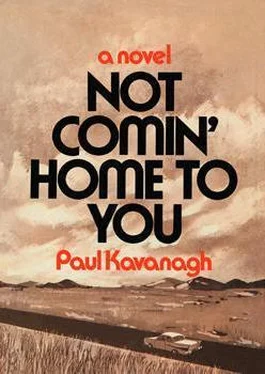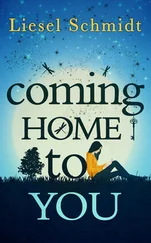Paul Kavanagh - Not Comin' Home to You
Здесь есть возможность читать онлайн «Paul Kavanagh - Not Comin' Home to You» весь текст электронной книги совершенно бесплатно (целиком полную версию без сокращений). В некоторых случаях можно слушать аудио, скачать через торрент в формате fb2 и присутствует краткое содержание. Город: New York, Год выпуска: 1974, ISBN: 1974, Издательство: G.P. Putnam's Sons, Жанр: Криминальный детектив, на английском языке. Описание произведения, (предисловие) а так же отзывы посетителей доступны на портале библиотеки ЛибКат.
- Название:Not Comin' Home to You
- Автор:
- Издательство:G.P. Putnam's Sons
- Жанр:
- Год:1974
- Город:New York
- ISBN:978-0-399-11357-4
- Рейтинг книги:3 / 5. Голосов: 1
-
Избранное:Добавить в избранное
- Отзывы:
-
Ваша оценка:
- 60
- 1
- 2
- 3
- 4
- 5
Not Comin' Home to You: краткое содержание, описание и аннотация
Предлагаем к чтению аннотацию, описание, краткое содержание или предисловие (зависит от того, что написал сам автор книги «Not Comin' Home to You»). Если вы не нашли необходимую информацию о книге — напишите в комментариях, мы постараемся отыскать её.
Not Comin' Home to You — читать онлайн бесплатно полную книгу (весь текст) целиком
Ниже представлен текст книги, разбитый по страницам. Система сохранения места последней прочитанной страницы, позволяет с удобством читать онлайн бесплатно книгу «Not Comin' Home to You», без необходимости каждый раз заново искать на чём Вы остановились. Поставьте закладку, и сможете в любой момент перейти на страницу, на которой закончили чтение.
Интервал:
Закладка:
“That’s right.”
“And he wants you there after class. After everybody else goes on home. Just you and him in an empty classroom.”
She saw her mistake now. Why couldn’t she have said Miss Culver or Mrs. Skirm or Miss Tuthill or even made up a name? Mr. McCulloch had come to mind because he was the teacher most likely to keep her after class, poorly as she was doing in algebra, but she should have realized it would be a mistake to mention any male teacher. Her father would have offered objections to a female teacher as well, but he would never have voiced them so strongly.
He said, “I know about those old men. Old schoolteachers, and everybody thinks they’re respectable as the First National Bank, and then they get some dumb little girl off by herself. Those old men.”
“Mr. McCulloch’s not old.”
“Oh?”
“He’s about twenty-five,” she said, and then saw that this was only making it worse. “Or thirty, maybe. But not what you’d call old.”
Her mother and father exchanged glances. Her father said, “You ever stay after school with Mis- ter McCulloch before?”
“No.”
“You positive, Miss?”
“No, I never did. I—”
“You be home this afternoon by three thirty. Hear?”
“But I promised—”
“Then you break that promise, hear? Goddamn you, don’t you have the sense God gave a goose? Do you want to wind up a round-bellied whore like your sister Judy? Do you want to be a tramp that has to leave town and never come back? Is that the kind of name you want for yourself, Miss?”
Yes! Yes, that’s just exactly what I want. To he like Judy. To get out of this place and never have to see it again, and never have to look at you again, at any of you, at any of the people in this town, to be out of it once and forever and never come back, yes, that’s what I want.
“No,” she said.
“You be home by three thirty.”
“All right.”
“You tell that arithmetic teacher he has to send home a note before I give my permission for you to stay late. You watch how he changes his tune. Meantime you come straight home and help your mother around the house.”
“I will.”
The Spanish test was easy. After class she heard some kids moaning about how hard it had been, and she couldn’t understand it. She had only had to stop and think on one word, “dangerous,” and even then she had remembered almost immediately that it was “peligroso.” The other words she’d gotten right without even thinking.
And of course she had made no spelling mistakes. Many of the other students frequently misspelled words in Spanish, and she found this incomprehensible. Anyone could spell things wrong in English, but Spanish was set up to make such errors impossible. There were a few rules to learn and then everything was clear; if you heard a word you could spell it, and if you read a word you could always pronounce it correctly, because the rules worked without exception. There was a sentence in her textbook: “Spanish is a completely orthographic language.” She liked that word, “orthographic,” and she liked the concept it embodied.
You would think all languages would be orthographic. It would make life so much simpler for everyone. Of course, it would put a lot of spelling teachers out of work. And you couldn’t have any spelling bees in a country with an orthographic language.
She imagined herself trying to explain a spelling bee to a native of Madrid. “But Señorita, they stand there and take turns spelling words aloud? Son asnos!”
In her other classes, as she sat daydreaming and writing her name in her notebook, she spent a lot of time thinking about Spanish. The concept of spelling bees appealed greatly, and she elaborated mentally on a conversation concerning them. She tried to conduct both sides of the conversation in her head. Her vocabulary was not really large enough for all her thoughts on the subject, and the glossary in the back of her Spanish text failed to fill in all the gaps.
It was funny how she was so good in one subject, so interested in it, and so poor at and bored by the others. She even enjoyed being called on in Spanish class. Words came quickly to her then, and the nervousness that was otherwise a part of such moments was not present when she spoke in Spanish. Perhaps because she was speaking in a language not her own, and thus it was as though she were talking in another person’s voice.
It was interesting to think about these things. It was more interesting than what was being said in her other classes, and it was less disturbing than thinking about what she would do after school.
She wanted to go to that movie.
Suppose she said that Mr. McCulloch had insisted. He had told her that she was in grave danger of failing algebra, and that he would not have time for her later in the week, and an hour or two of private instruction could clear up all the problems she was having, and—
No. It wouldn’t work. The more intense she made Mr. McCulloch’s arguments, the more her father would become convinced that Mr. McCulloch had ideas about her that had nothing to do with equations and logarithms. And if she made enough of a thing out of it, her father might even decide to confront Mr. McCulloch and demand an explanation, and if that happened she would have the choice of admitting her lie or brazening it out and hoping he would decide to speak to Mr. McCulloch right after he fixed the porch and painted the house, which would leave her safe for the next twenty years.
And even if he believed that Mr. McCulloch compelled her to stay, and even if she found some way to convince him that her algebra teacher was not a threat to her virginity (by intimating that Mr. McCulloch was queer for boys or something, but doing it carefully, because it would upset her father to learn that she had any information on such topics) he would still be furious with her for choosing to disobey her father rather than her teacher.
She had promised to go straight home.
But she couldn’t bear to go straight home. She wanted to see that movie.
If she went to the movie, she couldn’t possibly be home before six o’clock. The movie would start at three thirty — they always did, to accommodate kids from school — and with the coming attractions and all it would last two hours at the least, and by the time she got home it would be six or close to it. Maybe there was something she could invent to account for being two and a half hours late. Normally this would not be much of a problem, but the morning’s discussion had put an edge on things.
She would have to go home. The movie would still be playing the next day, and she could see it then.
But—
When the last bell rang she dawdled at her locker, purposely delaying the inevitable. At last she walked out the front doors and down the steps. The sun was as bright as it had been yesterday, the sky as clear and cloudless.
As she approached the front walk, a car pulled to the curb alongside two girls who were standing and talking. She recognized them — both seniors. The car was not one she had noticed around town before. It was very distinctive, an Oldsmobile Toronado with the body painted in an unusual shade of blue and a gleaming white vinyl top. She couldn’t see the driver’s face, but saw him lean across the front seat and say something to the two senior girls.
She saw them exchange glances and giggle, and one of them said something and the driver said something in reply, and they giggled again, and one of the girls shook her head. The driver straightened up behind the wheel and the car pulled off.
She followed it with her eyes, thinking that she could have made up a whole story about the car and the person driving it. She watched as the car slowed several times, finally stopping a hundred yards or so down the street. After a few seconds the door on the passenger side opened and a girl got in. She was too far away for Betty to recognize her.
Читать дальшеИнтервал:
Закладка:
Похожие книги на «Not Comin' Home to You»
Представляем Вашему вниманию похожие книги на «Not Comin' Home to You» списком для выбора. Мы отобрали схожую по названию и смыслу литературу в надежде предоставить читателям больше вариантов отыскать новые, интересные, ещё непрочитанные произведения.
Обсуждение, отзывы о книге «Not Comin' Home to You» и просто собственные мнения читателей. Оставьте ваши комментарии, напишите, что Вы думаете о произведении, его смысле или главных героях. Укажите что конкретно понравилось, а что нет, и почему Вы так считаете.












